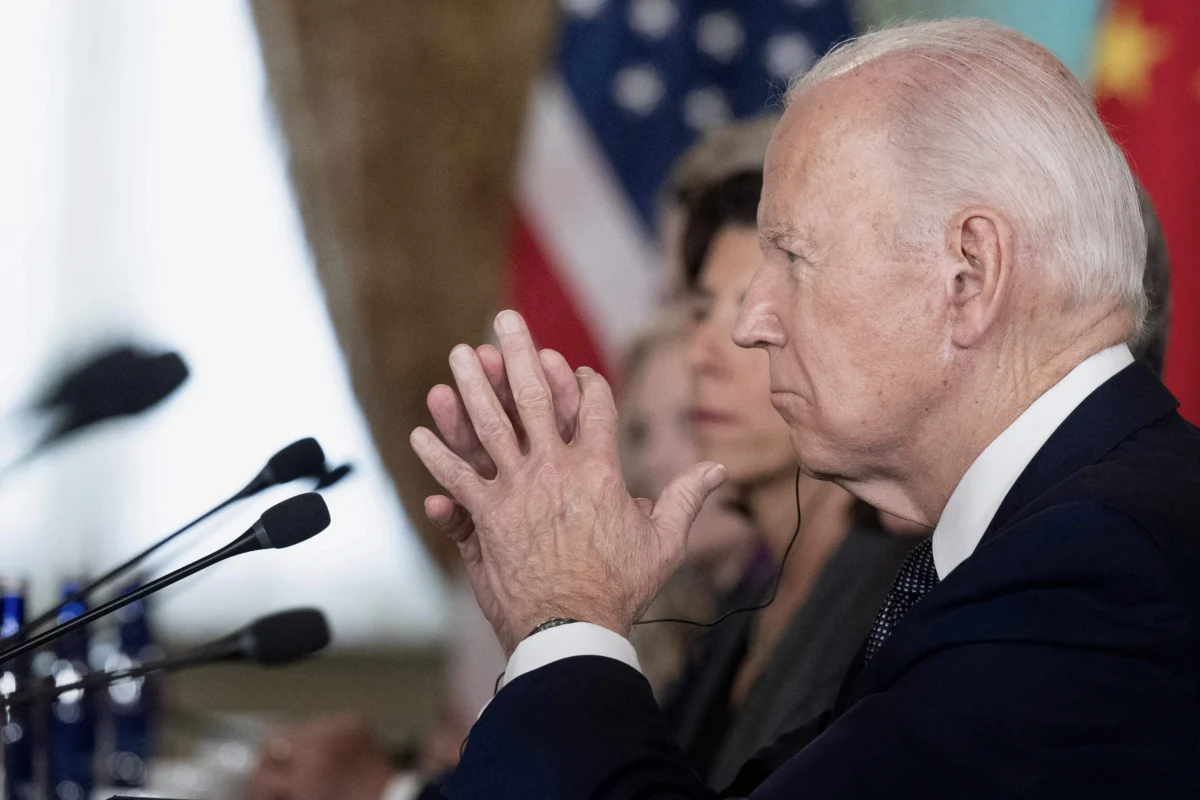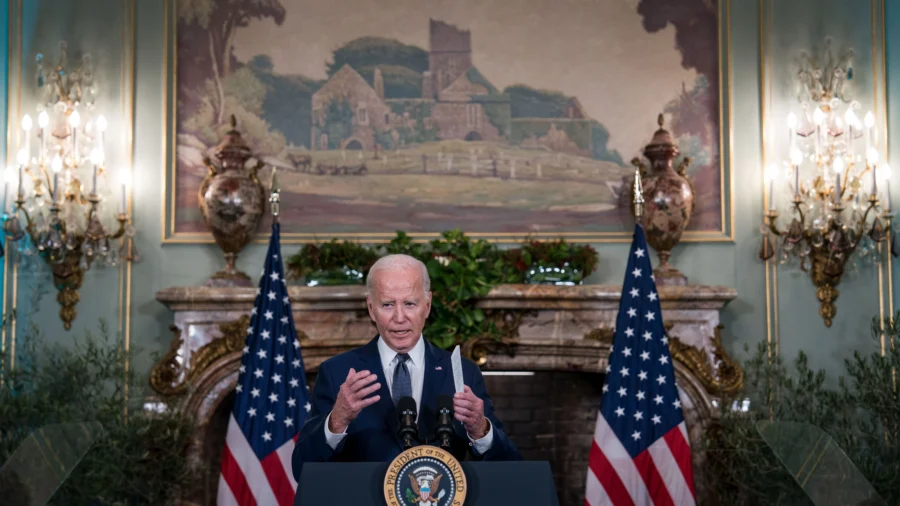Following a high-stakes meeting in San Francisco, President Joe Biden touted that the United States and China had “some of the most constructive and productive discussions” on the sidelines of the Asia-Pacific Economic Cooperation Leaders’ Summit. However, critics point out that the summit achieved minimal progress on the key bilateral issues.
After hours of meeting with Chinese Communist Party leader Xi Jinping at a secluded historic estate south of San Francisco, President Biden highlighted a few key outcomes: restoring high-level military dialogue, getting China’s commitment to reduce fentanyl exports to the United States, and tackling the risks of artificial intelligence.
President Biden made it clear that the purpose of the meeting was to manage “competition responsibly so it doesn’t veer into conflict.”
However, the summit made little or no headway on the most important bilateral issues, including Taiwan, as well as China’s theft of intellectual property, economic coercion, and human rights violations.
The president’s off-the-cuff remark at the end of his press conference became the most headline-grabbing aspect of the meeting.
As he was exiting the press conference, President Biden was asked if he would still refer to the Chinese leader as a “dictator,” as he did in June.
“Well, look, he is. I mean, he’s a dictator in the sense that he is a guy who runs a country, that’s a communist country that’s based on a form of government totally different than ours,” he said.
Even more remarkable was the reaction of Secretary of State Antony Blinken. Video footage shows him wincing when the president called the CCP leader a “dictator” for the second time this year.
Beijing denounced President Biden’s comments the next day.
The high-stakes meeting on the sidelines of the Asia-Pacific Economic Cooperation summit was both leaders’ second face-to-face meeting during the Biden presidency. Their previous in-person meeting took place in November 2022 at the G20 summit in Bali, Indonesia.
Taiwan Conundrum
The White House expressed concern ahead of the meeting over China’s attempt to meddle in Taiwan’s elections. Taiwan is one of the most controversial bilateral problems between the two countries, as China considers the self-ruled island to be its own territory.
Following the meeting, President Biden said he cautioned the Chinese leader against interfering in Taiwan’s upcoming elections.
“I made it clear: I didn’t expect any interference, any at all,” he told reporters during the press conference.
The upcoming presidential elections in Taiwan in January are crucial, as they’ll determine the island’s relationship with China.
Tensions over Taiwan haven’t been resolved during the discussions, according to Keith Krach, a billionaire entrepreneur and former undersecretary of state.
“President Biden’s warning to China not to interfere in Taiwan’s elections underscores the sensitive nature of Taiwan’s sovereignty and the importance of democratic processes. It suggests that while tactical discussions may take place, strategic and ideological differences regarding Taiwan remain a significant point of contention between the United States and China,” he told The Epoch Times.
President Biden reaffirmed during the meeting his commitment to the One China policy, which states that the United States doesn’t recognize Taiwan’s independence.
“We maintain an agreement that there is a One China policy and that I’m not going to change that. That’s not going to change,” he told reporters when asked about China’s military operations around the island and the U.S. commitment to defend it.
“That’s about the extent to which we discussed [the issue],” President Biden said.
The most important deliverable of the Biden–Xi meeting was the meeting itself, according to Rupert Hammond-Chambers, president of the US-Taiwan Business Council, a nonprofit organization dedicated to fostering trade and business relations between the United States and Taiwan.
“It’s important that Washington and Beijing talk and have open lines of communication. However, it cannot be talk for talk’s sake,” he told The Epoch Times. “In the Bush and Obama eras, bilateral discussions were the priority for the United States, and we would self-censor our interests in pursuit of that dialogue. China understood this well and used it as leverage, making significant gains at U.S. expense under those two presidencies.”
Mr. Hammond-Chambers has concerns that the CCP is persisting in its efforts to limit the Biden administration’s backing for Taiwan through coercion.
“The Biden Administration did curb its support for Taiwan in the run-up to the meeting,” he said, noting that Taiwanese presidential candidate and Vice President William Lai Ching-te’s transit through the United States a few months ago “was severely curtailed in an effort to minimize Beijing’s pique over his trip.”

Curbing Fentanyl Exports
During the meeting, China agreed in principle to restrict the export of chemicals used in the manufacture of fentanyl, a synthetic opioid 50 times stronger than heroin that has triggered the deadliest drug epidemic in U.S. history.
As part of the deal, the State Department said the United States would lift its sanctions against China’s Institution of Forensic Science, which is accused of conducting mass surveillance and human rights violations in the Xinjiang region.
At the beginning of their meeting, both leaders underlined the importance of having dialogue despite their differences. However, many have voiced doubts about the CCP’s sincerity.
The Biden–Xi meeting “was an embarrassment, but unsurprising,” Sen. Rick Scott (R-Fla.) said in a statement to The Epoch Times.
“I do not trust a word that Xi Jinping says, and neither should any American, including Joe Biden. Actions speak louder than words. And communist China’s actions have told us that they choose to be our enemy.”
Adam Savit, director of the China Initiative at America First Policy Institute, a Washington-based think tank, agrees and says the CCP leader isn’t sincere about mending fences with the U.S. government.
“Xi’s actions have shown he’s not worthy of his promises and not serious about improving ties with the United States,” he told The Epoch Times.
The CCP has strengthened alliances with Russia and Iran, both of which are actively involved in wars against U.S. allies, and has intimidated Taiwan and violated its sovereignty, increased naval aggression against the Philippines in the South China Sea, continued human rights abuses in China, and flagrantly stolen intellectual property, according to Mr. Savit.
“Giving Xi a high-profile meeting with the American president on American soil rewarded this dangerous behavior,” he said.
Other China critics have also criticized the Biden administration for not doing more to hold Beijing accountable.
“I don’t think that the leadership that we have in place right now is strong enough to push back against China,” Rep. Harriet Hageman (R-Wyo.) told The Epoch Times’ sister media NTD in an interview.
The death toll from the fentanyl crisis alone is reason enough for the administration to be pushing back very strongly against Chinese policies and the CCP, she said.
Exclusive Dinner Draws Criticism
Another important event at the summit was the dinner meeting between U.S. business executives and the Chinese leader. The business leaders reportedly paid $40,000 per person for the exclusive meeting with the communist ruler, attracting a lot of criticism.
Among the U.S. executives who were seated at Mr. Xi’s table at the event were Apple’s Tim Cook, BlackRock’s Larry Fink, and Blackstone’s Stephen Schwarzman, according to Bloomberg.
Rep. Mike Gallagher (R-Wis.), chairman of the select committee on the CCP, criticized the event in a letter.
“It is unconscionable that American companies might pay thousands of dollars to join a ‘welcome dinner’ hosted by the very same CCP officials who have facilitated a genocide against millions of innocent men, women, and children in Xinjiang,” Mr. Gallagher wrote in the letter to the National Committee on U.S.–China Relations, an organizer of the event.
“China is ready to be a partner and friend of the United States,” the CCP leader said during the meeting with business leaders.
Mr. Krach believes that China isn’t open for business and that U.S. executives won’t be influenced by Beijing’s “charm offensive.”
“U.S. business leaders, acutely aware of the economic turbulence within China, are far from convinced by Xi Jinping’s assurances,” he said.
“The collapse in exports, the turmoil in the real estate sector, and significant divestments from foreign investors underscore a reality that cannot be masked by diplomatic charm.”
From The Epoch Times


